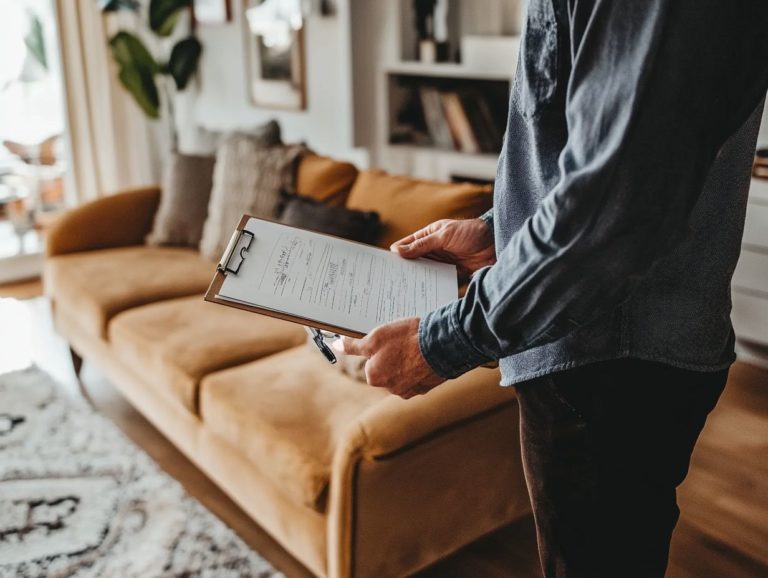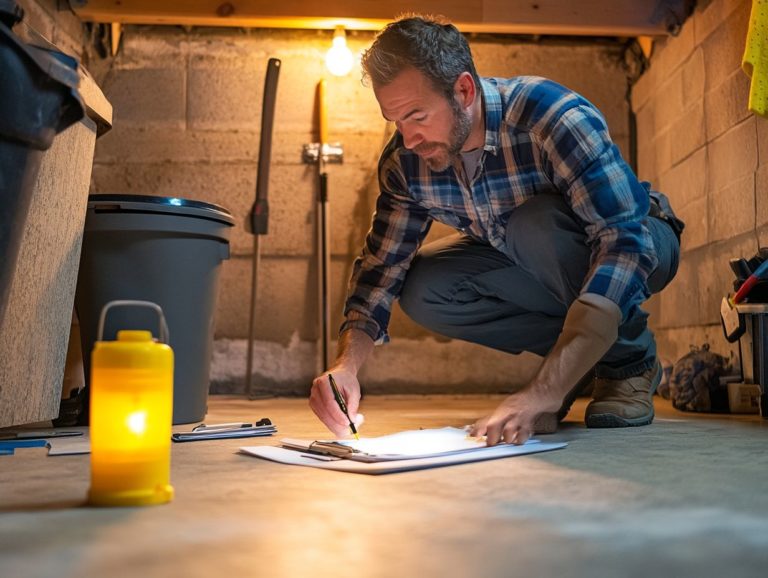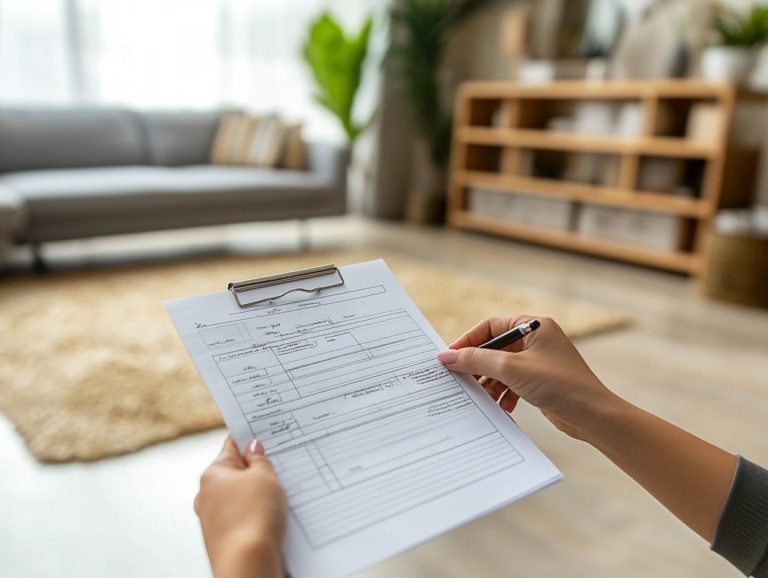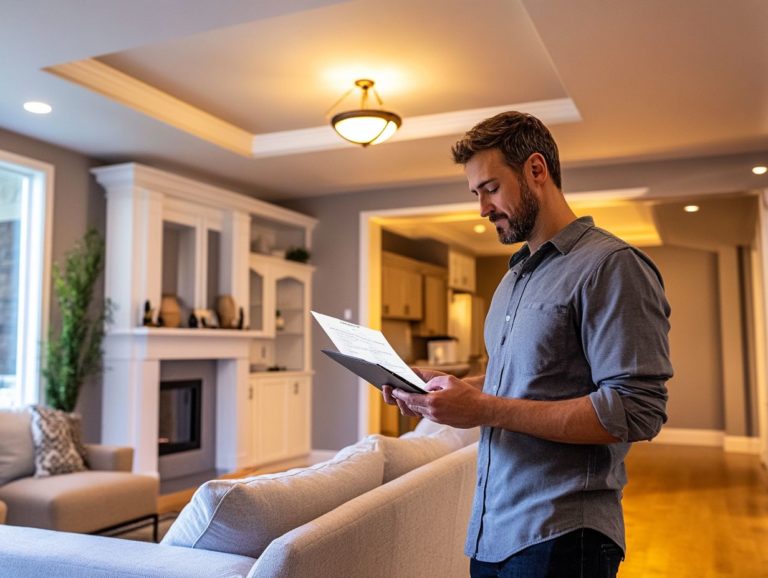The Importance of Home Inspections for New Homeowners
Buying a home is an exhilarating journey, yet it can also feel overwhelming, particularly for those stepping into homeownership for the first time.
One essential step that frequently slips through the cracks is the home inspection. This process not only reveals potential issues lurking beneath the surface but also offers invaluable peace of mind.
This article delves into the ins and outs of a home inspection. It guides you on when to schedule one, what to anticipate during the process, and how to select a trustworthy inspector. Let’s dive deeper into why home inspections are so essential.
By the end, you ll grasp the significance of this critical step and how it can save you time, money, and stress as you settle into your new home.
Contents
- Key Takeaways:
- Understanding the Purpose of Home Inspections
- When to Schedule a Home Inspection
- What to Expect During a Home Inspection
- The Cost of Home Inspections
- Benefits of Home Inspections for New Homeowners
- Tips for Choosing a Reliable Home Inspector
- Frequently Asked Questions
- What is a home inspection and why is it important for new homeowners?
- Who typically conducts a home inspection?
- When should a home inspection be scheduled for new homeowners?
- What are some common issues that can be uncovered in a home inspection?
- Can a home inspection be helpful for new homeowners even if no major issues are found?
- What should new homeowners do after receiving a home inspection report?
Key Takeaways:

Home inspections provide valuable information about the condition of a new home, emphasizing the importance of home inspections for new homeowners and helping them make informed decisions about their purchase.
Scheduling a home inspection during the early stages of the home buying process can save time, money, and stress in the long run.
Home inspections identify potential issues, give new homeowners peace of mind, and provide understanding the importance of home inspections for leverage in negotiations for repairs.
Understanding the Purpose of Home Inspections
Grasping the importance of a home inspection for buyers is crucial for both buyers and sellers navigating the real estate landscape.
A home inspection is a fundamental process that assesses the property’s condition prior to a purchase. It enables buyers to uncover both major and minor issues that could impact their investment.
Engaging a professional home inspector results in an inspection report that reveals hidden concerns, safety risks, and necessary repairs that may require attention.
This knowledge gives you the power to negotiate confidently with the seller and make well-informed decisions about your home purchase.
What is a Home Inspection and Why is it Important?
A home inspection is an in-depth evaluation of a property’s condition, typically conducted before you make a purchase. During this process, a qualified inspector meticulously examines various components of the home, from the roof down to the foundation, while assessing critical systems such as plumbing, electrical, and heating, ventilation, and air conditioning systems.
This thorough examination uncovers potential issues and offers valuable insight into the property’s overall stability and safety. For you as a buyer, grasping these details can profoundly influence your decision-making, as the inspection report may highlight necessary repairs or maintenance that could impact negotiations.
Conversely, for sellers, understanding their property’s condition promotes transparency, which can build trust and facilitate smoother transactions between both parties.
When to Schedule a Home Inspection
Scheduling a home inspection at the optimal moment is crucial for both buyers and sellers. It guarantees that the property is evaluated well before the closing date of the transaction.
This timing provides sufficient opportunities for any necessary repairs or negotiations to unfold, especially when dealing with specific rules for FHA loans, which often come with specific property condition requirements.
Taking this step seriously can make all the difference in ensuring a smooth and successful home purchase.
Best Time to Conduct a Home Inspection
The ideal moment to conduct a home inspection is right after your offer has been accepted but before the closing date. This timing ensures that both you and the seller have a clear understanding of the property’s condition.
This is a critical step that can make or break your home purchase! It enables your agent to coordinate effectively, allowing for any issues to be addressed before finalizing the deal.
By proactively scheduling the inspection soon after your offer’s acceptance, you can leverage the findings to negotiate repairs or even adjustments in price, ultimately steering the outcome in your favor.
Grasping the property’s state at this juncture gives you the power during negotiations and promotes transparency among all parties involved. In the end, the right timing not only streamlines the transaction but also builds trust throughout your home-buying journey.
Ready to schedule your home inspection? Don’t wait get peace of mind today!
What to Expect During a Home Inspection
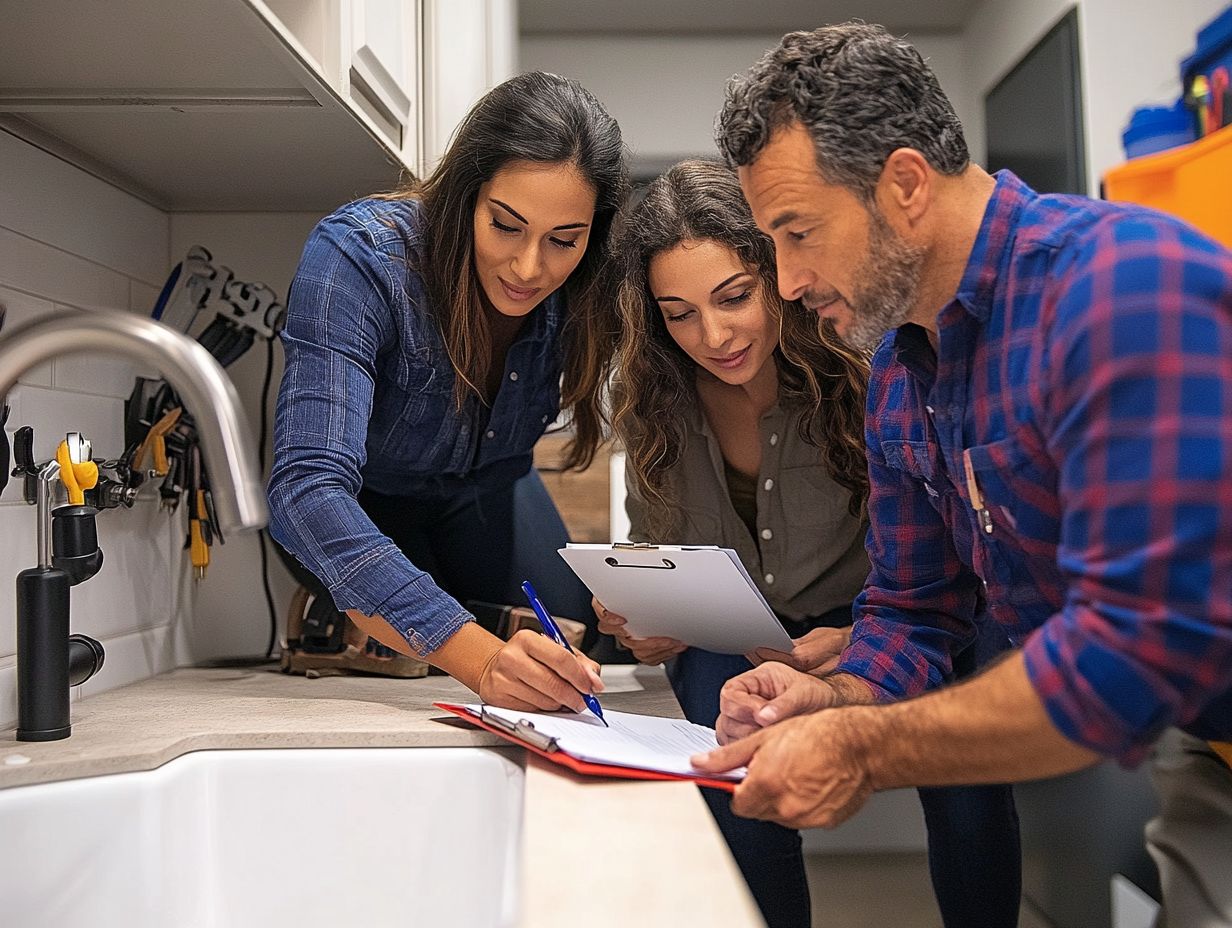
During a home inspection, expect a detailed assessment of the property by a trained professional.
This expert evaluates the condition of the home, including its structure, electrical system, and plumbing.
The inspection uncovers issues that could affect the home’s value or safety, providing you with vital insights, especially regarding the role of home inspections for first-time buyers, before making your investment.
Common Areas and Components Inspected
Expect a thorough check of key components like the structure, electrical system, plumbing, air conditioning, and foundation. These checks are crucial for safety and maintaining the property s integrity.
The structural assessment checks the framework and load-bearing walls, which are walls that support the weight of the house, ensuring the home is stable and free from serious damage.
Electrical systems are carefully evaluated for outdated wiring or unsafe installations that may cause fires.
Plumbing is essential; leaks are detected, and the functionality of water supply and drainage systems is confirmed to avoid costly water damage.
The air conditioning unit s efficiency is assessed to ensure a comfortable indoor climate and good air quality.
Finally, the foundation is inspected for cracks or signs of settling since weaknesses here can lead to major structural issues later.
The Cost of Home Inspections
The cost of home inspections varies widely based on factors like size, condition, and the expertise of the inspection company.
Understanding these factors helps you prepare for inspection expenses and minimize potential financial risks related to repairs.
Factors that Affect the Cost
Many elements can influence inspection costs, including the property’s value and the complexity of the required services.
Larger homes typically need more detailed inspections, which can increase fees. Properties in high-demand areas often come with higher inspection rates due to increased demand.
Considering older or unique properties may also raise inspection costs because they often come with unique challenges requiring specialized knowledge.
Understanding these factors as a buyer is essential, as they relate directly to the home s overall value and your investment decisions.
Benefits of Home Inspections for New Homeowners
Home inspections provide numerous benefits for new homeowners. They empower you to identify potential issues before purchase, allowing for negotiation of necessary repairs and highlighting the importance of home inspections for property buyers.
This proactive approach significantly reduces the risk of buyer’s remorse, ensuring you move into your new home with confidence.
Identifying Potential Issues and Negotiating Repairs

One of the key benefits of a home inspection lies in its ability to uncover potential issues that could lead to significant headaches down the road. This insight allows you, as the buyer, to negotiate repairs with the seller effectively.
This process gives you the power to make informed decisions and deepens your understanding of the property’s condition. When serious concerns such as plumbing issues, electrical problems, or structural integrity challenges come to light, they become invaluable bargaining power during negotiations.
By bringing these findings to the forefront, you can request necessary repairs, negotiate a lower sale price, or even ask for credits toward future work. These interactions influence not only the financial aspects of the transaction but also the dynamics of the buyer-seller relationship.
They help establish a degree of trust and transparency that is vital during this critical phase of purchasing a property.
Peace of Mind for New Homeowners
A thorough home inspection gives you peace of mind that’s priceless as a new homeowner, ensuring you’re fully aware of your home’s condition, including any safety risks that may not be immediately visible. Understanding the importance of pre-purchase home inspections can help you make informed decisions.
This clarity gives you the power to make informed decisions about your purchase, potentially saving you from unexpected expenses in the future. Being aware of the state of essential systems like plumbing and electrical allows you to tackle necessary repairs early, enhancing your overall comfort in your new space.
When you pair a home inspection with a comprehensive home warranty, you further solidify your investment, adding an extra layer of protection against unforeseen breakdowns. This combination boosts your confidence and eases your worries, enabling you to truly enjoy your new dwelling without the nagging fear of hidden issues lurking beneath the surface.
Tips for Choosing a Reliable Home Inspector
Selecting a reliable home inspector is essential for securing a comprehensive and honest assessment of a property’s condition, as highlighted in the importance of home inspections in real estate.
Look for trustworthy organizations like ASHI, InterNACHI, and the Better Business Bureau (BBB) as invaluable resources to guide you in choosing qualified inspection services that meet high standards.
Qualities to Look for in a Home Inspector
When selecting a home inspector, prioritize qualities like professionalism, extensive experience, and the ability to deliver a detailed inspection report that highlights potential issues and safety risks.
A reliable inspector will have a keen eye for detail, ensuring that every critical component of the property, from the foundation to the roof, is thoroughly assessed.
Their experience is invaluable, allowing them to identify not only the obvious concerns but also those subtle signs that might indicate deeper, hidden problems.
A dependable inspector will communicate effectively, presenting findings in a way that’s easy for you to understand as a future homeowner. This clarity enhances the inspection experience and gives you the power to make informed decisions, potentially saving you from costly repairs down the line.
Questions to Ask Before Hiring a Home Inspector
Before you hire a home inspector, it’s wise to ask targeted questions about their experience, the specific inspection services they offer, and any connections with trusted organizations like the BBB.
Understanding the inspector s qualifications and expertise is vital for ensuring a comprehensive evaluation of the property. You should inquire about how long they ve been in the business, the types of properties they specialize in, and the number of inspections they typically conduct each year.
It s also essential to clarify the specific inspection services provided, such as radon testing or mold assessments, to make sure all necessary areas are covered.
Connections with local or national associations can significantly boost the inspector s credibility, so asking about their memberships can offer you further reassurance of their professionalism and commitment to industry standards.
Frequently Asked Questions
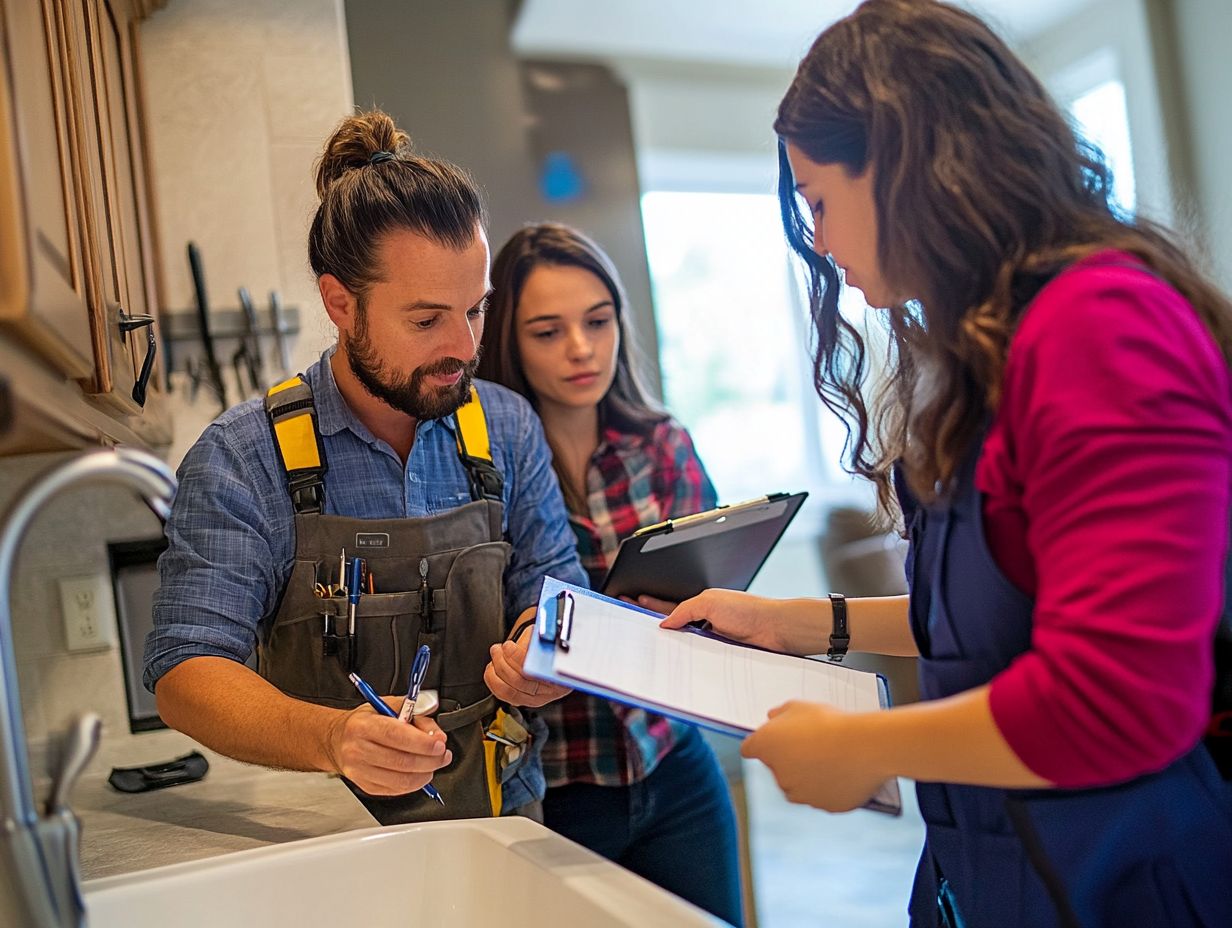
Here are some common questions to help you further understand home inspections.
What is a home inspection and why is it important for new homeowners?
A home inspection is a detailed check-up of a property’s structure and systems. Understanding the importance of thorough home inspections helps new homeowners spot potential issues, giving them peace of mind and guiding their investment decisions.
Who typically conducts a home inspection?
A licensed home inspector conducts the inspection. They assess various aspects of the property and provide a detailed report on their findings.
When should a home inspection be scheduled for new homeowners?
Schedule a home inspection after making an offer but before signing the final purchase agreement. This helps identify any issues before closing the sale.
What are some common issues that can be uncovered in a home inspection?
Common issues include structural concerns, plumbing or electrical problems, mold, pest infestations, and safety hazards. Addressing these can save homeowners from costly repairs later.
Can a home inspection be helpful for new homeowners even if no major issues are found?
Yes! Even without major problems, the inspection report offers vital details about the home s systems. This knowledge helps homeowners plan for future maintenance.
What should new homeowners do after receiving a home inspection report?
Review the report carefully with your real estate agent. Discuss any concerns or questions. If significant issues arise, you may need to renegotiate or address them before closing the sale.
Keep the report for future reference and use it to develop a maintenance plan for your new home.

